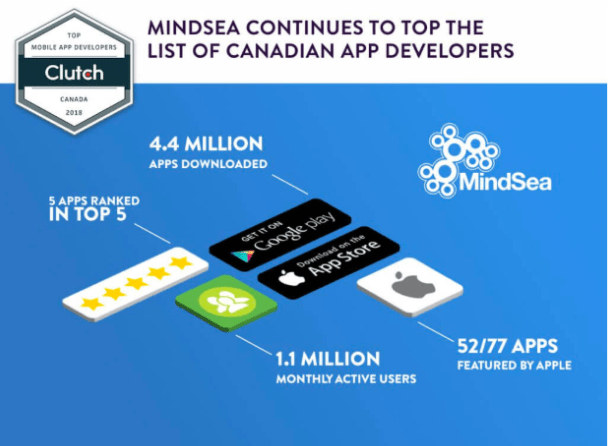So you’ve been sitting on an AWESOME business idea.
You thought of it a few months ago, maybe even a few years ago, but you haven’t really made the decision to go all-in and start turning that idea into a reality. Maybe you don’t have the time, maybe you’re just not sure if the idea is any good. Chances are, one of the main things holding you back is this:
You don’t have a technical co-founder or development partner.
In your mind right now, there’s no possible way you could bring your idea to life because you don’t actually have the technical know-how to build an app.
So what should you do?
You definitely aren’t ready to give up and let someone else turn your idea into a game-changing business, but you’re feeling stuck.
The good news is this:
Finding a development partner for your business isn’t as painfully difficult as you may think. It can actually be pretty painless if you understand the best way to find the perfect person (or people) to partner with.
In this post, we’re going to break down the process for expanding your network and pitching your business idea to potential technical co-founders or development partners, so you can turn your awesome idea into something real.
Let’s dive in.
Understand your core value proposition
Before you actually start the search for a development partner, you need to make sure you know what you’re talking about.
If you show up to a meeting with a potential technical co-founder or development partner without a clear understanding of what you do, why you do it, and who you’re doing it for, your chances of landing that second date are not so good.
Before you panic because you think your answers to these big questions must be carved in stone, understand this:
It’s OK for these things to shift over time.
Right now, your answers should demonstrate that you’ve done your research and that this is more than just a crazy idea you thought up in the shower yesterday. Once potential partners know you’re serious, they can examine your vision and decide if it’s something they can get behind as well.
Validate your concept ASAP
After you’ve nailed down what you do, why you do it, and who you’re doing it for, the next step you need to take before meeting with a potential partner is a big one.
You need to validate what you’re working on.
Sure, you may think you’re building an innovative mobile app to help 20-somethings manage their time more effectively, but does the audience you’re targeting have any interest whatsoever in what you’re building?
This doesn’t mean you need to have a fully functioning product with all the bells and whistles right here, right now—after all, that’s why you’re looking for a development partner. All you have to do is validate that you’re on the right track, that there’s a need for and an interest in what you’re doing.
Whether you sign up a dozen early-access users or gather a handful of experts who endorse your vision, proving that your startup idea has traction is key.
Start spending time in co-working spaces
Now for the fun part! By now you have a business idea that you know like the back of your hand and that has been validated by your target audience or experts in the space.
Instead of jumping on LinkedIn, Facebook, Quora, Twitter, Reddit, Instagram, and every other channel you can think of to shout about your awesome idea and beg a technical co-founder to come on board…
Start immersing yourself in the community.
If you have a local startup or tech co-working space, make it part of your routine to spend a few hours there each day. While you’re there, be friendly with the other people working. When you see them taking a break, strike up a conversation.
Keep in mind, there are some pretty big no-no’s in the co-working world:
DO NOT just pull up a chair next to someone and start pitching.
DO NOT interrupt someone who’s working just to chat.
DO NOT show up to ask, ask, ask without giving any value back.
A co-working space is a community. If your plan is to show up, ask everyone in the room if they know a development partner you can meet with, then leave as soon as you have your answers … good luck.
If you want the community to help you, you need to help the community. Become someone who provides value, whether by sharing your expertise if they ask for it, or simply showing up with fresh bagels on a Monday morning.
Give your network a chance to play matchmaker
Once you’ve started to build those connections and expand your network, it’s time to see if you have any matchmakers in the group.
At this point, it’s perfectly OK to send a message to someone you know well, via LinkedIn or another channel, ASKING if you can pitch your business idea to see if they know anyone you could partner with.
The key is to ask beforehand—nobody wants to be met with a surprise pitch when they show up ready to work on their own thing.
If they agree to hear your pitch and help you out (and a lot of people will if you’ve been intentional about building a relationship) make sure you bring as much information as you can to the meeting: a bare-bones business plan, a somewhat-functional prototype, the concept validation you’ve done—bring it all.
If a mutual connection can introduce you to a development partner, you’re already in a much better position to build the relationship required to take your business idea to the next level.
Find a development agency to partner with
If you’re able to find a technical co-founder either through your own relationship building or through a recommendation from your network, that’s fantastic.
If you try and try and try but come up empty, don’t panic.
Here’s some good news for you:
You don’t NEED to have a technical co-founder in order to start growing.
Having someone dedicated to the technical side who is totally sold on your vision is a good thing, but it’s not an absolute requirement to succeed. The truth is, you may not even need a technical co-founder in the early stages.
Early on, as you’re trying to build your first MVP and find product-market fit, a lot of the technical work can be handled by a development agency … if you can find the perfect one to partner with.
The key is finding an agency that’s been there, done that. You want a team of people who’ve helped startups just like yours get off the ground. The best way to find the expertise you need is to look at the top app development agencies on sites like Clutch.co, and check out their portfolios.

For example, the MindSea team has helped companies like Proposify, Adam Helps, and the National Post build mobile apps to take their business to the next level.
As you investigate a development agency, try to find case studies that describe their process to see if it aligns with the unique needs of your startup.
Now over to you
You have an awesome idea for a business that might just change the world in time. The tricky part is finding the right person or team of people to help you bring your vision to life. It can be tough, but remember this:
You don’t absolutely NEED a technical co-founder from the start to build a successful company. Just look at Pinterest—the social media giant had no real technical co-founder when it first got off the ground.
As you navigate the stages of launching your startup, the MindSea team would love help. You can schedule a FREE meeting with one of our product strategists today to talk through exactly what it will take to bring your idea to life.
If you want to start building an MVP for your startup, we’ve also put together a free guide that breaks down the Five Things Every Startup Needs Before Launching An MVP so you can make the MVP-building stage as smooth as possible.



